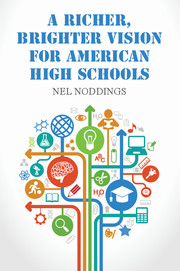Book contents
- Frontmatter
- Contents
- Introduction
- 1 Unity of Purpose
- 2 Vocational Programs
- 3 What Might Have Been: Women's Traditional Interests
- 4 A Better Adult: Continuing the Search
- 5 Parenting
- 6 The Common Core Standards
- 7 Critical Thinking
- 8 Collegiality, Caring, and Continuity
- 9 The Curriculum and Its Setting
- 10 Planning, Enacting, Evaluating
- 11 The Professional Preparation of Teachers
- 12 Reflecting on the Brighter Vision
- Notes
- Bibliography
- Index
4 - A Better Adult: Continuing the Search
Published online by Cambridge University Press: 05 June 2015
- Frontmatter
- Contents
- Introduction
- 1 Unity of Purpose
- 2 Vocational Programs
- 3 What Might Have Been: Women's Traditional Interests
- 4 A Better Adult: Continuing the Search
- 5 Parenting
- 6 The Common Core Standards
- 7 Critical Thinking
- 8 Collegiality, Caring, and Continuity
- 9 The Curriculum and Its Setting
- 10 Planning, Enacting, Evaluating
- 11 The Professional Preparation of Teachers
- 12 Reflecting on the Brighter Vision
- Notes
- Bibliography
- Index
Summary
I have suggested that producing a better adult might serve as a unifying purpose for education. What should we mean by a “better adult”? So far, we have looked at two aspects of human life to explore as we consider what makes people “better”: vocation and homemaking. What follows in this chapter should be construed not as a prescription but, rather, as an invitation to think, reflect, and engage in a continuing dialogue – a never-ending, vibrant examination of what we mean by a “better adult” and by “education.”
It is important to remember that we are not seeking to construct one saintly ideal that will serve as a model of that better adult. In Chapters 2 and 3, on vocational education and women's interests, respectively, the variety of human interests and talents was emphasized, and that variety should continue to influence our search for a way to describe better adults. What may properly be thought of as universal is the whole range of categories that constitute human life and that we seek to enhance through education: moral, physical, emotional, intellectual, aesthetic, social, home/family, vocational, civic, and spiritual. In this chapter, we continue the search by examining three areas of education that contribute substantially to the development of better adults: command of the fundamental processes, education for citizenship, and moral education.
COMMAND OF THE FUNDAMENTAL PROCESSES
In today's postindustrial society, it is obvious that command of some basic knowledge and skills is essential. For many years, the fundamental processes were known as the 3Rs, and these were the skills to be addressed in elementary schooling. Today we would have to add certain technological skills, and I have suggested also that we should add oral language, or “speaking.” As pointed out earlier, inability to speak grammatical English can be a handicap comparable to the inability to read a newspaper or to manipulate the numbers involved in daily life. An acceptable level of oral language should certainly be regarded as one of the fundamental processes.
- Type
- Chapter
- Information
- A Richer, Brighter Vision for American High Schools , pp. 54 - 70Publisher: Cambridge University PressPrint publication year: 2015



